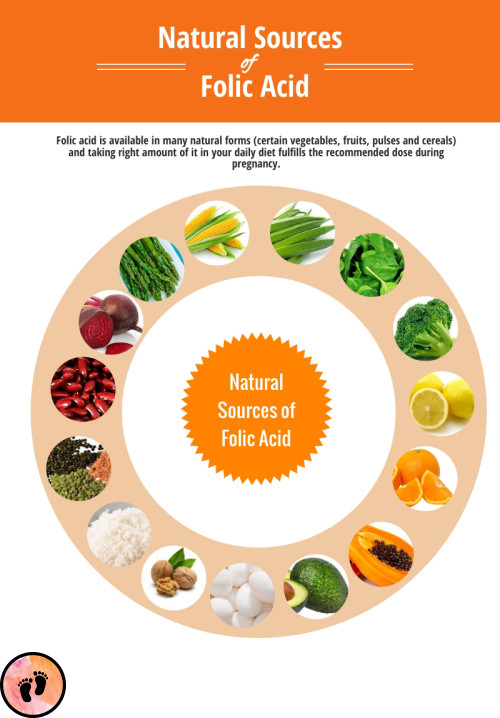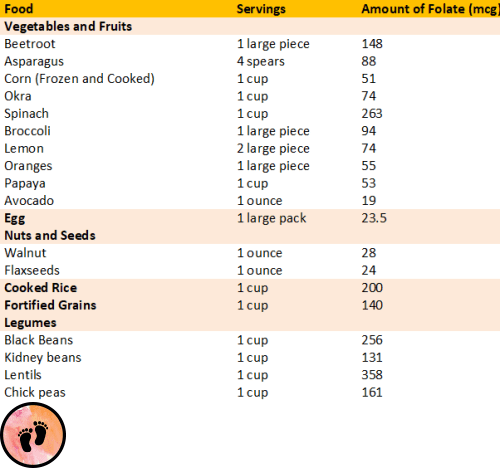Folic acid in pregnancy and pre-pregnancy
You are swirled up with many thoughts when you plan to start your family. Isn’t it? You start preparing yourself financially so that you can raise your baby with the best of the resources. But unfortunately, we miss to prepare ourselves physically to den the baby.
Many people are unaware of the fact that one must have a healthy body even to conceive, followed by pregnancy to have a healthy baby. And this process starts from the very day you decide to take this step for expanding your family.
One must make necessary changes in the lifestyle when one plans to conceive; stop smoking, consuming alcohol, limiting your caffeine uptake, having a balanced diet and much more that helps you to lead a healthy life.

Folic acid (Vit. B9) is a key chief that must be supplemented daily before 3 months of getting pregnant until the first trimester of pregnancy.
It is not only necessary during conception but also plays a vital role in a baby’s development until 12 weeks of pregnancy.
What is Folic Acid?
Folic acid also known as Vitamin B9 or folacin, is one of the members from Vitamin B (water-soluble vitamins) family that plays a vital role in DNA-RNA synthesis, cell division and RBC formation.
Folic acid is the synthetic form while folate is a natural form of Vit. B9. Folic acid is used as a dietary supplement (which then gets converted to folate in the body) as it is not made by the human body and thus, categorized as an essential vitamin.
Benefits of Folic acid in pre-pregnancy and first trimester of pregnancy?
Folic acid plays a compelling role in the baby’s overall health development as they are responsible for cell division and most importantly, building the central nervous system.
Video explaining Benefits of Folic acid for Pregnant woman
You might not be aware of your pregnancy during the early weeks of conception when the major neurological development of your baby takes place. Hence, it is advisable to take folic acid supplement before 3 months of your conception to build enough levels of Vit. B9 that gives protection to the baby against neural tube defects and orofacial cleft and reduces such risk by 50% or more.
It has also been researched that folic acid reduces the risk of pre-eclampsia and early labour.
Neural tube defect and Orofacial cleft during pregnancy
During the third week of pregnancy, neural tube formation occurs; which is the precursor for the Central Nervous system (Brain and spinal cord). When this neural tube misses closing completely, it results in Neural Tube Defects (NTDs). NTDs can affect the spine, brain, skull or neck.
Types of NTDs (Neural Tube Defects)
- Spina bifida affecting the spine
- Anencephaly affecting brain
- Encephalocele affecting skull
- Iniencephaly affecting neck
Orofacial Cleft
It is a facial defect which includes cleft lip or cleft palate or both, that results due to improper closure of facial tissues. This birth defect may lead to speech, feeding or hearing issues.
In India, 4 out of 1000 children suffer from Neural tube defects and 2 out of 1000 children suffer from Orofacial cleft disorder owing to folate deficiency.
How much folic acid in pregnancy one should take?
The dose usually prescribed before conception and in the first trimester of pregnancy is 400 mcg.
Females who are diagnosed with folate deficiency are prescribed about 600 mcg or above. Folic acid deficiency is usually seen in females who suffer from liver, kidney or gastrointestinal disorders and ones who overconsume alcohol.
Females who have had a baby with neural defects earlier are prescribed with 4000 mcg dose.
Folic acid food sources
 Natural sources of Folic acid in Pregnancy
Natural sources of Folic acid in PregnancyThe major sources of folic acid include fruits & vegetables, eggs, nuts, rice and legumes. Spinach, lentils, black beans, chickpeas being the best sources.
 Folic acid sources and folate per servings for pregnancy
Folic acid sources and folate per servings for pregnancyHow long you need to take Folic acid?
Even though the prime benefits of folic acid uptake are before and until the first week of pregnancy, a woman is recommended to take the same throughout the pregnancy and even during breastfeeding.
During the second and third trimester, the recommended dose of folic acid is 600-800 mcg that minimizes the risk of preterm birth.
Breastmilk is the natural resource of folic acid for babies. It is recommended that breastfeeding mothers should have 500 mcg of folate every day to meet the baby’s folic acid requirement for their development.
A right concentration of folate in a pregnant woman is extremely important.
We know the ill effects of folic acid deficiency, but few pieces of research also prove that there is a small subset of females (around 10%) who demonstrated the high concentration of folate in their blood samples which are again harmful to a baby and may lead to autism.
Few studies have also shown that folic acid is required to produce healthy sperm. If the man is not getting enough folic acid through diet, he needs to get supplemented by a daily dose of 400 mcg for conception.
A key step to expand your family is a healthy diet. A healthy diet leads to healthy parents and healthy baby and in turn a healthy world.
References


Recent Posts
Homemade Pregnancy Test
How to Prevent Pregnancy Stretch Marks
Is It Safe to Eat Ice Cream During Pregnancy
Breast Pain in Pregnancy
7 Tips to getting pregnant faster
COMMON INFECTIONS DURING PREGNANCY
Pregnancy Diet: Apples during Pregnancy
Advertisement
Duis leo. Donec orci lectus, aliquam ut, faucibus non
Join Our Community of Expecting Parents Today!
Subscribe to get updated on latest and relevant pregnancy-related details